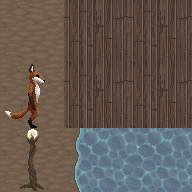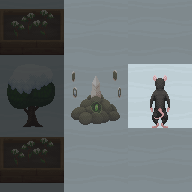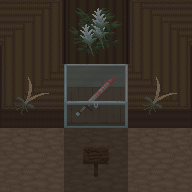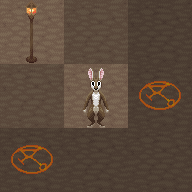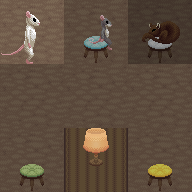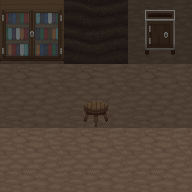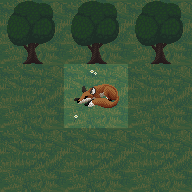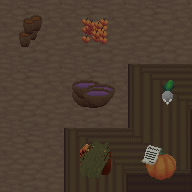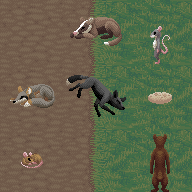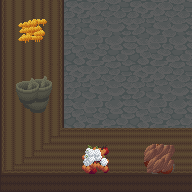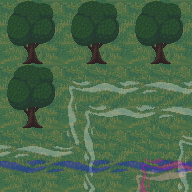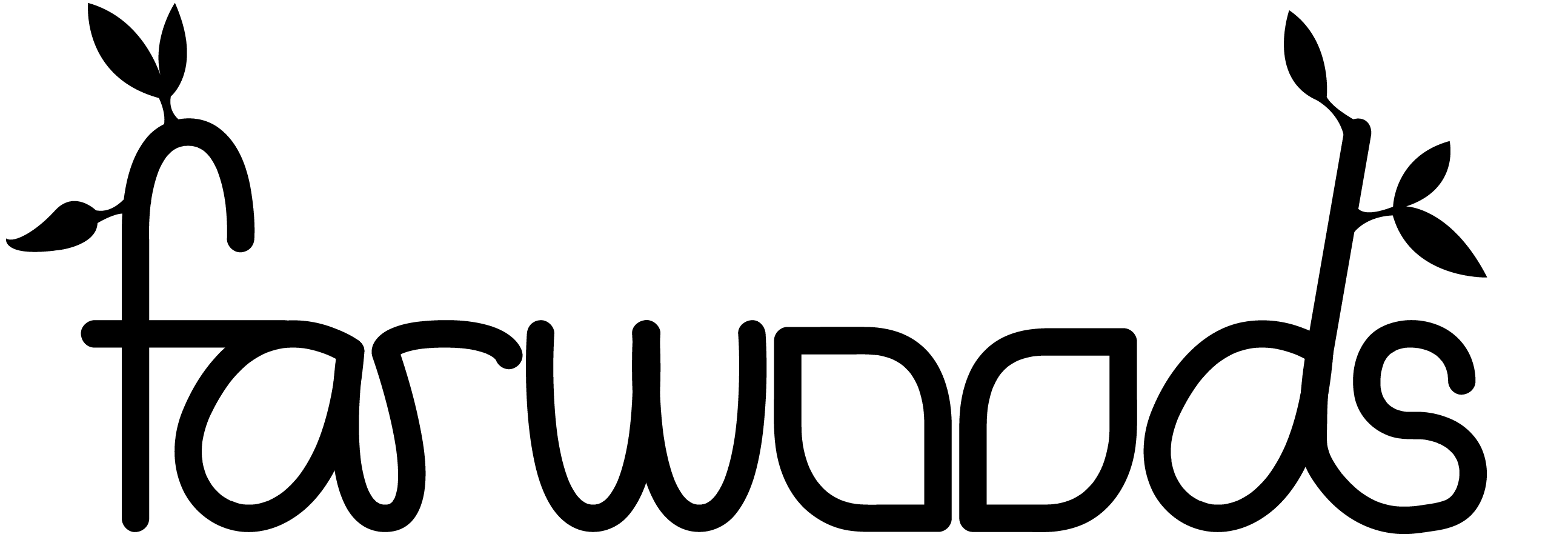Magic
Abandon all impatience, ye who enter here! Mages are the nichest of niche characters, the most punishing to subpar builds, the most time-consuming to develop, and the most complex and unintuitive. And yet... if you have the moxie to brave these pitfalls, you can harness some of the most powerful and interesting abilities in the game. You certainly won't want for company; mages of every stripe are demanded by critters of all persuasions. A mage is a potent ally to have. Those interested in tapping into your skills will work hard to befriend you, and happily invest in your abilities early on to reap the rewards later. This guide assumes that you have read the guides on controls and user interface, so read the relevant portions of those guides if you have not already.
There are eleven Magic skills in the game, of which you will learn at least two. They are ordered by roughly how easy their spells are to cast, which will affect how much you will need to invest in them to use them and increase in power.
- Crystal Magic: This skill is practically non-negotiable for any mage; your skill in it will determine how punishing your failures in casting magic are, and indirectly influences how powerful all of your spells will be. When you attempt to channel, charge, or cast magic with a crystal, failure will shatter it unless you are sufficiently trained in Crystal Magic, destroying it entirely. This means that unless you are very, very good at the magic discipline you are practicing, you will lose valuable crystals constantly. Each crystal essentially represents an investment of your time proportional to its value, not to mention the need to acquire fresh quartz crystals for all the ones you shatter, so don't mistreat yourself like that! Crystal Magic will be the first and possibly primary Magic skill of every magic user unless they are a complete masochist.
- Spell Resistance: Magic users who wish to go toe-to-toe with other mages will likely wish to invest in this spell. Harmful magic, like orange and black magic, can be negated completely with this spell, which is the only counter to the hostile mage's skill. Even non-mages who have reason to fear magic users may want to invest some points in this skill. Even a low chance to resist a spell is better than none.
- Yellow Magic (easy): Everyone is happy to see a yellow mage! This form of magic allows you to satiate characters' needs (including your own), and reduce the rate at which those needs accumulate. This makes them the equivalent of a scrounger, a cook, and a brewer in one, at the cost of nothing but mental resources. Mages who want to be self-sufficient will want to learn this discipline since they will likely have no other way of keeping themselves fed and hydrated. Yellow mages can also be useful in combat, trading their Mind to grant fighters Stamina and keep them in a fight for longer!
- Green Magic (average): Simple but useful, green magic is primarily used as a supplement to crafting. Green mages can turn wood into ironwood, to create more powerful wooden weapons and armor with. They can also turn acorns into ironnuts, which can be flung for the same damage as a paw. Finally, they are highly sought after to empower jewelry, increasing the stat bonus its gem provides.
- Blue Magic (average): When someone has a message to send, a blue mage is far more convenient than a courier. Blue magic primarily allows the mage to communicate telepathically with others anywhere in the world, but it can also be used to bypass language barriers, giving a character full comprehension of another critter regardless of the languages they are speaking, and allow creatures to see in the dark as though it were day. Blue mages are also the enemy of rogues, able to grant characters significant bonuses to spotting stealthy actions.
- Red Magic (average): With red magic, you can enchant fighters and their equipment, making it easier for them to strike and block, and making their weapons more damaging and their armor more protective. Needless to say, a fighter buffed by a red mage is a terrifying prospect to face!
- Purple Magic (average): This is the magic of travel, allowing the mage to increase others' movement speeds, teleport distances both short and long in the blink of an eye, and even bring others with them. No one can hide from a purple mage, nor can anyone find them if they do not wish to be found, and nowhere is safe from them but the inside of a locked burrow.
- Black Magic (hard): Feared by all, the curses of a black mage inflict their lasting displeasure on all who cross them. They can make critters lame and helpless, and slowly damage them until they collapse. While they have little direct combat ability, they can make any fighter who messes with them regret it. Powerful black mages can cripple characters for a long, long time, without the intervention of white magic.
- White Magic (hard): As you might imagine, white magic is primarily concerned with health. White mages can restore health directly as well as increasing the rate at which it regenerates, but more important than that is their ability to dispel harmful status effects. A powerful white mage can negate the effects of Viciousness and Black Magic, limiting the pain users of those skills are able to inflict on other critters. They just need to make sure that they don't themselves fall victim, or they'll have a harder time recovering!
- Gray Magic (hard): Essentially, gray magic allows you to store time within crystals. Gray crystals can be used to restore Mind and extend the duration of magical effects on a critter, both beneficial and harmful. Very powerful gray mages can even extract more Mind from a gray crystal than was placed into it, offsetting the cost of retrieving it to the point that no Mind might be wasted in the process, and in fact they may gain more mental resources than they ever expended. This is particularly useful combined with other magical disciplines, as it allows the mage to use more mental resources at once than they actually have. Gray mages are also anti-mages, able to place Mindtrap sigils which make magic more difficult to cast in an area around them, and use the Mind harvested by the sigils to charge their own crystals.
- Orange Magic (hard): The most powerful, and most difficult, of all magical specialties, orange magic is combat magic, and combines many of the abilities of fighters into a single crystal. Orange mages can throw critters around and knock them down, they can stun them, they can inflict steady damage on them, and most importantly, they can deal massive bursts of damage with lightning bolts, which bypass all physical means of protection. While perhaps not as loathsome as black magic, orange magic is a mage's primary means of self-defense. While a black mage is better equipped to punish someone for attacking them, an orange mage is better equipped to send them flying across the forest and landing on their face instead of getting beaten down and mugged for their crystals.
Building a Mage
(top)By far the most important stat in a mage's build is their core stat, Magic. Most characters have little use for Magic, but mages can't get enough of it. In fact, mages can almost be built to maximize Magic at the expense of all other stats, except that they need Intelligence and Craft to increase their Mind pool. Mind is absolutely crucial to a mage, but there are two major milestones for a mage's Mind pool: 30 Mind and 60 Mind. Channeling a crystal costs 5 Mind, and most spells cost between 4 and 15 Mind (with a mode of 6), so 30 and 60 maximum Mind is just the right amount to get the most out of your pool without leftovers that can't be used.
You don't need to have 30 Mind fresh out of character creation, though it'll be helpful to reach as soon as possible. But in order to ever reach 60, you will need a minimum of 5 as the sum of your Intelligence and Craft scores, and ideally a multiple of 5 as well. You don't need to explicitly build for these stats, but you should prioritize them above others when assigning your scores. What you do need to build for is Magic. Magic skills are extremely sensitive to your Magic score, more than any other skill. There are all kinds of soft limits you will run into while using magic based on your level in the skill and your score in the stat. If it's your first time making a magic user, you should definitely specialize them as a pure mage, because mixing it with any other build is going to be very difficult to tune correctly.
Mages are hit hardest by the soft cap on stat bonuses for skills you have few ranks in, because they are generally always building for a score of 18 in Magic, but they won't receive the full bonus for this score until they've invested significantly in a Magic skill. The minimum level you'll want in a Magic skill in order to have basic competence in it is 30 -- at that level you will be able to channel crystals and cast basic spells without shattering every crystal you get your hands on. But in the long term, you'll want at least 40 in every Magic skill you intend to practice.
The first nine intervals will give you 20 skill points each, for a total of 200 (including the 20 you start with). This is enough skill points to reach 40 in Crystal Magic and your first color of choice. Until then, you probably won't be casting much magic, and should focus on exploring the world, meeting people, and securing a reliable source of crystals. You'll also get your burrow certificate and can place your burrow to safely store your belongings.
Because no races have any innate bonuses to Magic, 18 is the highest score you can hope for; it will allow you to reach basic competence at a target skill level of only 25, requiring 45 skill points to reach. This also means that no race is inherently better at magic than any other; mice are often the natural choice for mages because of their high Intelligence, but Intelligence is completely irrelevant to the actual use of magic aside from the size of your character's Mind pool. Don't be fooled; you can make a viable mage from any race.
"Basic competence" is a misleading metric, however. The actual results of Magic are more difficult to ascribe binary success to than any other skill, even smithing, and represent constantly shifting targets. This is why magic is the most complex and unintuitive system in the game. There are too many moving parts to build an accurate and unambiguous measure of how high your Magic score should be or how many points you should put in each magic skill in order to create a certain type of magic user. These things must be felt out through trial and error, and judged on a case-by-case basis.
Therefore, to build an effective magic user, simply ensure that your Magic stat is as high as you can afford, as usual, preferably at least 10. If you do want to make a character cross-specialized in Magic and other skills, like a battlemage, you can still easily do so. You just need to keep in mind that your spells will be weaker than pure mages, and you will have more difficulty casting the harder spells that might be available to you.
Amassing Power
(top)A mage with 18 Magic and 50 levels in a magic skill is, on their own, a completely useless mage incapable of performing any magic. Mages derive their actual power from quartz crystals, which have been channeled into the color that they wish to cast. Quartz crystals can be found by scrounging through sand and mining rocks, so unless your mage is capable of doing one of those things, they will have to source their blank crystals from someone else. Smiths will often have plentiful crystals given to them by miners, who have no use for them, and they can also be requested from scroungers who otherwise have little reason to dig around in barren sand. You will want as many quartz crystals as you can get your hands on — a mage can never have too many. So long as you have a steady supply, the only thing standing between you and untold magical power is time.
A blank crystal is equally useless, but it represents the potential for power. Quartz crystals are magical conduits, and it is up to a mage to fill them with magic of a particular color by channeling that magic into them. Each attempt to do this costs 5 Mind; if they fail, then the stress on the crystal may cause it to shatter to pieces unless the mage is able to hold it together with Crystal Magic. Only with the channeled crystal as a conduit can the mage focus their magic enough to cast spells. Once a crystal is channeled, it has a certain amount of charge in that color. The crystal's charge level represents the potency of the magic channeled into it, and dictates the power of all spells that are cast through that crystal.
A freshly-channeled crystal allows a mage to cast magic, but that magic will not be very powerful. Nonetheless, if you can reliably channel crystals into a color, then you are experienced enough with that magical discipline to cast spells in it. The degree to which crystal charge strengthens the effect of the spell varies depending on the spell and the discipline, but generally you can expect some effect even from a low-charge crystal. It's wise to keep a few on hand for when making sure the spell gets cast is more important than how potent it is.
Channeling crystals takes time. Charging them takes even more time, because it scales in difficulty to the current charge of the crystal. Charging a crystal costs 6 Mind, with the same risks as channeling it. The more potent the magic surging inside the crystal, the more likely you are to shatter it by trying to fan the flames even higher. This is the primary time sink for mages; there is no hard limit on how high you can charge a crystal, but fewer and fewer will survive the process each time, funneling candidates down into an ever-shrinking supply of ever more valuable conduits through myriad cycles of resting and charging. Thus, as a crystal becomes more highly charged, it represents an exponentially larger amount of the mage's time to create. These charged crystals are also harder to cast with, which makes them more likely to break when you fail to use them. While it is considerably easier to cast with a crystal than charge it, bear in mind that if most crystals are not surviving your charging attempts, you may have trouble using the ones that do.
Most of a mage's time will be spent in solitude, working with their crystals and testing the limitations of their abilities until their supply of blank crystals is exhausted or they are comfortable with what they have. This is why mages are the most time-consuming of characters to play, and tend to be among the least social. For more information on what exactly you can do with magic, check out the documentation page on magic. Otherwise, that's the end of this guide, but feel free to return to the index and check out the others available to help you plan your characters!

